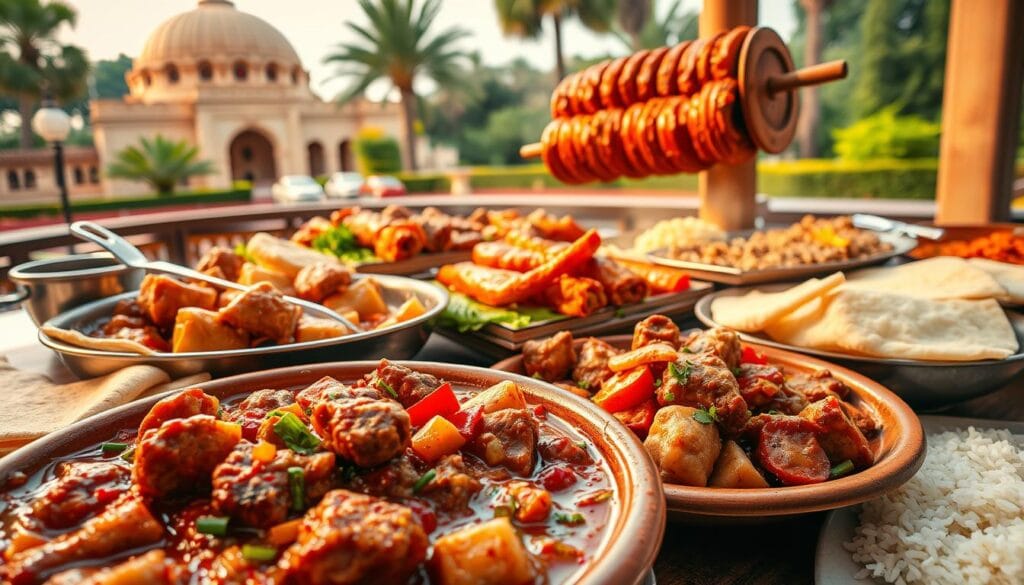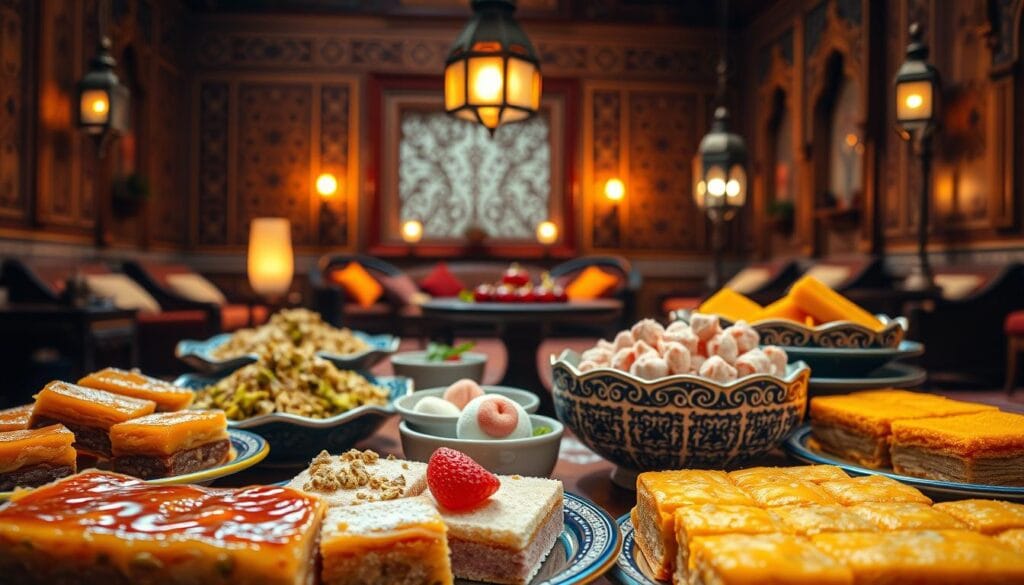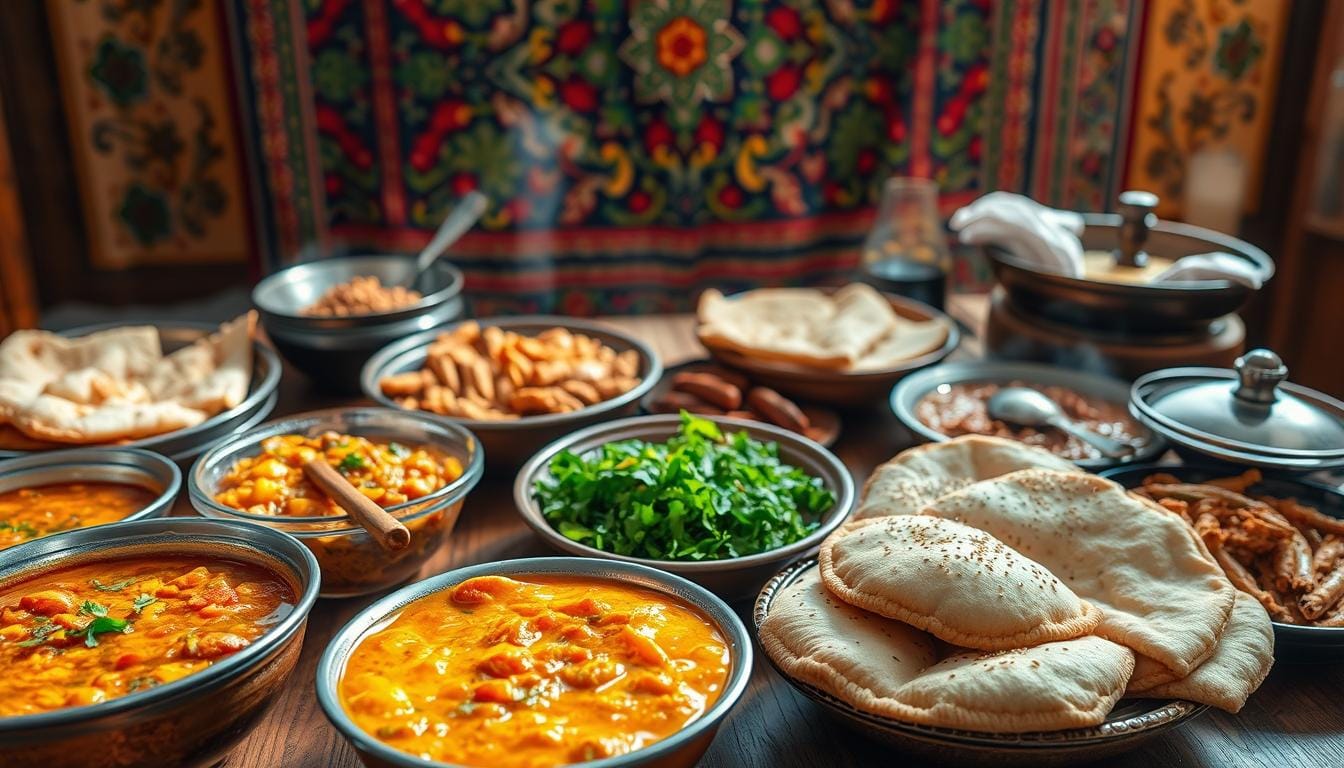As I share the richness of Islamic food traditions, I feel warmth and excitement. Islamic food recipes are more than just flavors and spices. They are about the love and care in every dish. From Kabsa, Saudi Arabia’s national dish, to North Africa’s hearty stews, Islamic cuisine shows the diversity and hospitality of Muslim cultures. Let’s explore delightful Islamic Dishes and traditional halal cooking together.
With over 2 billion Muslims worldwide observing Ramadan, food is key in this month of celebration and reflection. Traditional iftar meals and suhoor dishes are essential parts of our lives. Whether you’re planning an iftar party or want to try new halal dishes, this article is for you.
Key Takeaways
- Islamic food recipes are a reflection of the diversity and hospitality of Muslim cultures
- Kabsa is a popular Islamic dish that originated in Saudi Arabia
- Ramadan is a time of celebration and reflection, and food plays a significant role in this month
- Easy halal dishes can be prepared in under 30 minutes, making them perfect for busy lives
- Traditional Muslim cooking emphasizes the importance of halal ingredients and spices
- Islamic food recipes are not just about flavors, but about the love and care that goes into preparing each dish
- Suhoor meals should include nutrient-dense foods to sustain energy levels throughout the day
Understanding Islamic Food Traditions
Exploring Islamic cuisine means learning about halal ingredients and regional dishes. Moroccan cuisine is known for its spicy flavors, while MIDDLE EASTERN CUISINE is rich and diverse. Each area adds its own twist to delicious middle eastern meals. For ramadan recipe ideas, there’s a wide range, including samosas, hummus, and falafel.
In Islamic cuisine, using authentic arabic cuisine ingredients and methods is key. Halal ingredients like dates, barley bread, and honey are important. As we explore, we’ll find the rich tastes and smells of delicious middle eastern meals. We’ll also look at the special ramadan recipe ideas that make this cuisine stand out.
Some well-known authentic arabic cuisine dishes are:
- Tagine, a slow-cooked stew from North Africa
- Biryani, a flavorful rice dish from South Asia
- Falafel, a crispy and spicy street food from the Middle East
Essential Ingredients for Islamic Cooking
Preparing homemade halal recipes starts with the right ingredients. Traditional Muslim cooking uses spices, herbs, and more to create true flavors. Common spices include cumin, coriander, and cinnamon.
Having a well-stocked pantry is key for tasty popular halal dishes. You’ll need rice, lentils, and chickpeas. These help make everything from stews to salads.
https://www.youtube.com/watch?v=P0VEsJBOgGg
Fresh ingredients like veggies, fruits, and herbs are also important. For example, cucumber and dates are a healthy snack in many Islamic countries.
Here are some must-haves for traditional muslim cooking:
- Rice
- Lentils
- Chickpeas
- Cumin
- Coriander
- Cinnamon
With these, you can whip up many tasty homemade halal recipes. Try mixing spices to find your favorite dishes.
Popular Islamic Food Recipes to Start With
Exploring Islamic cuisine, we find many easy dishes great for beginners. There’s a wide variety, from delicious middle eastern meals to ramadan recipe ideas. Let’s look at some popular recipes that are both easy to make and tasty.
Classic iftar dishes include chicken biryani, falafel, and sambusa. These are easy dishes that need just a few ingredients. We’ll also check out delicious middle eastern meals for Eid ul-Fitr.
Popular ramadan recipe ideas include hummus, tabbouleh, and kebabs. These dishes are not only tasty but also simple to prepare. Whether you’re after easy halal dishes or delicious middle eastern meals, we’ve got you covered.
Savory Meat Dishes in Islamic Cuisine
Islamic cuisine is rich in flavors, with savory meat dishes being a big part. These include hearty stews and flavorful kebabs. They use authentic Arabic ingredients and homemade halal recipes.
Lamb Tagine: A Moroccan Delight
Lamb tagine is a classic Moroccan dish. It’s made with tender lamb, dried fruits, and spices. It’s often served at special occasions and is a staple in traditional Muslim cooking.
To make lamb tagine, you need lamb shoulder, onions, garlic, and dried fruits. These are common in homemade halal recipes.
Grilled Kebabs: A Middle Eastern Staple
Grilled kebabs are a favorite street food in the Middle East. They’re made with meats like lamb, beef, and chicken. The meats are marinated in spices and yogurt before grilling.
Looking for authentic Arabic cuisine or homemade halal recipes? Grilled kebabs are a tasty and simple option.

To make grilled kebabs, you’ll need ground meat, onions, garlic, and spices. These are common in traditional Muslim cooking. You can also experiment with different meats or spices.
Some popular variations include:
- Using lamb or beef for a traditional flavor
- Adding dried fruits or nuts for extra flavor and texture
- Using different spices, like cumin or coriander, for a unique taste
By following these tips and using authentic Arabic ingredients, you can make delicious meat dishes. These are perfect for any occasion. Whether you’re looking for homemade halal recipes or traditional Muslim cooking inspiration, these dishes will impress your taste buds.
Exploring Vegetarian Islamic Recipes
Islamic cuisine offers a wide range of tasty dishes for everyone. For those seeking easy halal dishes, vegetarian options are perfect. During Ramadan, it’s key to start your fast with healthy, tasty meals. Luckily, there are many ramadan recipe ideas to choose from.
Lentil soup is a favorite delicious middle eastern meal. It’s simple to make and full of nutrients. We’ll share a basic lentil soup recipe for a quick weeknight dinner. We’ll also talk about the importance of using halal ingredients and offer Ramadan cooking tips.
Other vegetarian dishes popular in Ramadan include stuffed bell peppers. They’re filled with rice, spices, and veggies. These meals are not only tasty but also help you regain energy after fasting.
Here are some tips for making easy dishes during Ramadan:
- Use halal ingredients and spices to ensure that your meals are permissible.
- Experiment with different recipes and flavors to keep your meals interesting.
- Don’t forget to stay hydrated by drinking plenty of water and other fluids.
Traditional Desserts in Islamic Cuisine
Exploring Islamic cuisine, we see that desserts are key to the culture. From authentic arabic cuisine to homemade halal recipes, these sweets are tasty and full of tradition. Let’s dive into the popular dishes that will make your taste buds happy.
Baklava, kunafa, and umm ali are famous desserts in Islamic cuisine. They’re made with phyllo dough, nuts, and honey. These treats are perfect for weddings and holidays. You can also make them at home with homemade halal recipes using dates, nuts, and rose water.
Here are a few examples of traditional desserts in Islamic cuisine:
- Baklava: a sweet pastry made with layers of phyllo dough, nuts, and honey
- Kunafa: a dessert made with shredded phyllo dough and cheese, typically served with syrup
- Umm ali: a traditional Egyptian dessert made with layers of puff pastry, milk, and nuts
These desserts are not just tasty. They also show the rich cultural heritage of Islamic cuisine. Whether you’re into authentic arabic cuisine or just want to try popular halal dishes, there’s something for everyone.

Tips for Hosting an Islamic Dinner
Hosting an Islamic dinner means creating a welcoming space. Use traditional decorations like gold, green, and blue. Also, play soothing music in the background. Serving easy halal dishes and delicious middle eastern meals brings everyone together.
For a special touch, serve traditional appetizers like hummus and stuffed grape leaves. Main courses can be Karachi style biryani and paneer tikka masala. Don’t forget desserts like Kunafa and baklava. Pair your food with tea and coffee for a complete experience. These dishes are perfect for ramadan recipe ideas.
Other tips include sending out invitations two weeks early. Be mindful of the timing and cultural significance. Add fun activities like henna painting and a global Eid knowledge challenge. These steps will help you host a memorable Islamic dinner.
Health Benefits of Islamic Foods
Exploring authentic arabic cuisine reveals many health benefits. Traditional muslim cooking uses wholesome ingredients for a balanced lifestyle. For example, foods from the Quran can greatly improve our health.
Islamic foods are good for our digestion, immunity, and heart. Foods like dates, olives, and pomegranates are full of antioxidants and nutrients. They are great for a healthy diet. Nutritional balance is key in traditional muslim cooking, focusing on whole foods.
Here are some health benefits of Islamic foods:
- Improved digestive health
- Enhanced immunity
- Heart health
- Stable blood sugar levels
- Weight management
Adding authentic arabic cuisine and homemade halal recipes to our diet brings many health benefits. Whether we want to boost our health or find healthy eating ideas, Islamic foods have something for everyone.
Resources for Studying Islamic Food Culture
Exploring Islamic cuisine reveals a world full of flavors and traditions. Whether you want to make easy halal dishes or plan a tasty Middle Eastern meal, there’s a lot to learn. You’ll find many resources to help you.
For a deeper dive into Islamic food culture, check out recommended cookbooks. They offer real recipes and valuable insights. Books like “The Ottoman Cookbook” and “The Middle Eastern Cookbook” take you on a culinary journey through history.
Joining online food communities is also a great idea. These platforms let you share recipes, learn from others, and get inspired. Social media groups and forums focused on Islamic cuisine are full of lively discussions and culinary celebrations.
FAQ
What is the importance of halal in Islamic cuisine?
Halal means what is allowed under Islamic law. It’s key in Islamic food. Halal rules guide what ingredients and how to prepare food that Muslims can eat.
How do delightful Islamic Dishes vary by region?
Islamic food varies a lot by region. Moroccan dishes are spicy, while Middle Eastern food is rich and aromatic. These differences come from local ingredients, traditions, and history.
What are some common spices used in Islamic recipes?
Islamic food often uses spices like cumin, coriander, cinnamon, cardamom, and saffron. These spices add unique flavors and smells to traditional dishes.
What are some must-have pantry items for authentic Islamic cooking?
For true Islamic cooking, you need halal meat, rice, lentils, chickpeas, and spices. Also, don’t forget olives, olive oil, yogurt, and more. These are the basics for many halal dishes.
What is a classic Islamic dish to try for beginners?
Chicken biryani is a great dish for beginners. It’s a flavorful rice dish with spiced chicken and fragrant spices. It’s easy to make and delicious.
How can I make authentic falafel at home?
Making falafel at home is easy. Mix chickpeas, herbs, and spices. Fry them well to get a crispy outside and a tasty inside.
What is a traditional Islamic meat dish to try?
Try lamb tagine, a Moroccan stew. It’s slow-cooked with lamb, fruits, and spices. The flavors are complex, and the lamb is tender.
What are some popular vegetarian Islamic recipes?
Lentil soup and stuffed bell peppers are tasty and healthy. They show how plant-based foods can be delicious in Islamic cooking.
What are some traditional Islamic desserts to try?
Try baklava and kunafa. Baklava is a pastry with nuts and honey. Kunafa is a creamy dessert with syrup. Both are sweet and authentic.
How can I host a memorable Islamic dinner?
Create a welcoming space with traditional decor and music. Serve delicious food with tea and coffee. Remember, hospitality is important in Islamic culture.
What are the health benefits of Islamic foods?
Islamic foods often use spices, grains, and plant proteins. These ingredients are nutritious. They can help you eat healthier and feel better.
Where can I find resources to learn more about Islamic food culture?
Check out cookbooks and online groups focused on Islamic food. They offer recipes and insights into Islamic food traditions. You’ll learn a lot and find authentic dishes.
We are interested in your feedback
There are no reviews yet. Be the first one to write one.

